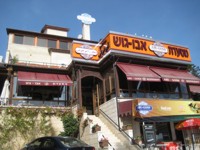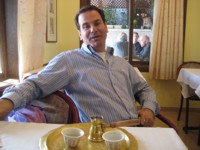Jan. 15, 2010
Abu Ghosh regains Guinness world record for largest plate of hummus
by Gil Zohar
ABU GHOSH -
In a Mid East version of the ping pong diplomacy between the United States and the People's Republic of China in the 1970s, Israel and Lebanon - ostensibly at war for more than six decades - have been trading the honor of preparing the world's largest plate of hummus. Israel regained the Guinness world record title last Friday (Jan. 8), thanks to the efforts of local restaurateur Jowdat Ibrahim who served up a whopping 4-ton plate of the chickpea spread, nearly doubling the record set in Beirut in October.
Ibrahim, 43, the proprietor of the Abu Gosh Restaurant here, borrowed a satellite dish from the nearby Globus-Golan broadcast station at Neve Ilan in which to serve his village's tasty specialty. With the town's main drag closed to traffic, hundreds of jubilant Israeli Arabs and Jews swarmed around the giant dish, many dancing and ululating, as a singer performed an Arabic love song to the tasty beige paste drizzled with olive oil.
|
Just after midday, Jack Brockbank - an adjudicator sent from London by Guinness World Records, confirmed that the Israeli chefs now held the record. He put the exact amount of hummus in the giant dish at 4,090 kg (9,017 pounds). The crowd then dined on the epic repast, with the leftovers being donated to Israel Defense Force soldiers and poor villagers. While Israelis can take pride in the achievement, for Ibrahim the world record - and the donation of the leftovers to the IDF - has a broader meaning symbolizing the integration of Israel's Arab minority within the country's Jewish majority. |
Abu Gosh Restaurant (Photo: Gil Zohar) |
"I'm proud that I put Abu Ghosh on the map, not just locally but all over the world - in Lebanon, Jordan, Qatar, etc. It's amazing that 50 TV channels reported the story including CNN live. People called me from all over the world to say congratulations to me, to my family, and to the State of Israel."
Attesting to the veracity of that, Ibrahim's cell phone did not stop ringing during our interview, with the restaurateur switching seamlessly between English, Arabic and Hebrew.
Displaying a copy of Monday's Arabic language Jerusalem daily al-Quds, Ibrahim smiles that Lebanon's tourism minister is planning to mount his hummus riposte at the Fatima Gate near the towns of Kfar Kila, Lebanon and Metulla, Israel - a site better known to Israelis as the Good Fence. Can hummus diplomacy lead to a breakthrough to peace?, he asks.
"[Lebanese Tourism Minister] Fadi Abboud wants to make a big pile of hummus for the homeless. I say 'Let's do it together.'"
Restaurateur Jowdat Ibrahim (Photo: Gil Zohar) |
Born in Abu Ghosh - the Arabic letter ghayin has no equivalent in English but is the sister letter of the guttural Hebrew 'ayin - Ibrahim sought his fortune in America as a young man. One day in 1989, after a decade of toiling in Chicago restaurants, fate smiled on him; he won $23-million in the Illinois state lottery. Ibrahim decided to share his good fortune with the 7,000 residents of his village - many of whom are related clansmen - by opening a restaurant and creating jobs. "I had the idea after the first Intifada started in 1987. Israelis stopped going to eat hummus in East Jerusalem," he smiles. |
Abu Shuqri on Tariq al-Wad street in the Old City's Muslim Quarter was one of those hummus eateries hard hit after its loyal Israeli clientele were scared away. Today there is a rival Abu Shuqri in Abu Ghosh, along with several dozen restaurants, sweet shops and coffee houses, and of course the eponymous Abu Gosh Restaurant on Derekh ha-Shalom, better known simply as Route 3975. Unique among them is Fundak Elvis, a roadside diner dedicated to The King of Rock 'n' roll. See page XX.
Every weekend some 10,000 to 15,000 Israeli and foreign tourists swarm over the charming village, visit its Crusader church whose Benedictine monks produce a passion fruit liqueur, and gorge on hummus and grilled meat. The twice annual Abu Ghosh Music Festival, held in the village's two landmark churches, ensures visitors come back for more than just the delectable hummus.
"I live here in Israel, as part of a minority, but I'm part of this country," explains Ibrahim. "The (Guinness World Record) ceremony gave hope to a lot of people. To see Jewish and Arab kids together here is a small step; the true adventure is to live together across the Middle East."
Ibrahim's co-existence sentiments are widely reflected in Abu Ghosh. The majority of the village's teenagers, who are exempt from IDF draft, volunteer for National Service, he notes. That modus Vivendi with the Jews dates back to 1947 and 1948 when Palestine erupted into civil war following the United Nations vote to partition the British mandate. While Arabs from the surrounding 35 villages in the Judean Hills responded to the faz'a (call to arms) and tried to stop the Jews' armored convoys creeping up the Bab al-Wad ravine to besieged Jerusalem, the residents of Abu Ghosh - perhaps remembering their origin in 16th century Circassia - remained neutral. Thus Abu Ghosh alone was spared the fate of having its houses dynamited and residents driven into exile as nascent Israel sought to preserve its corridor to the capital.
Though signs in Abu Ghosh attest to the battles the Palmach fought nearby in Israel's War of Independence, for Ibrahim those events are ancient history. "We live here. We have Israeli passports." Period.
And with hummus so tasty, what's the point of fighting?

